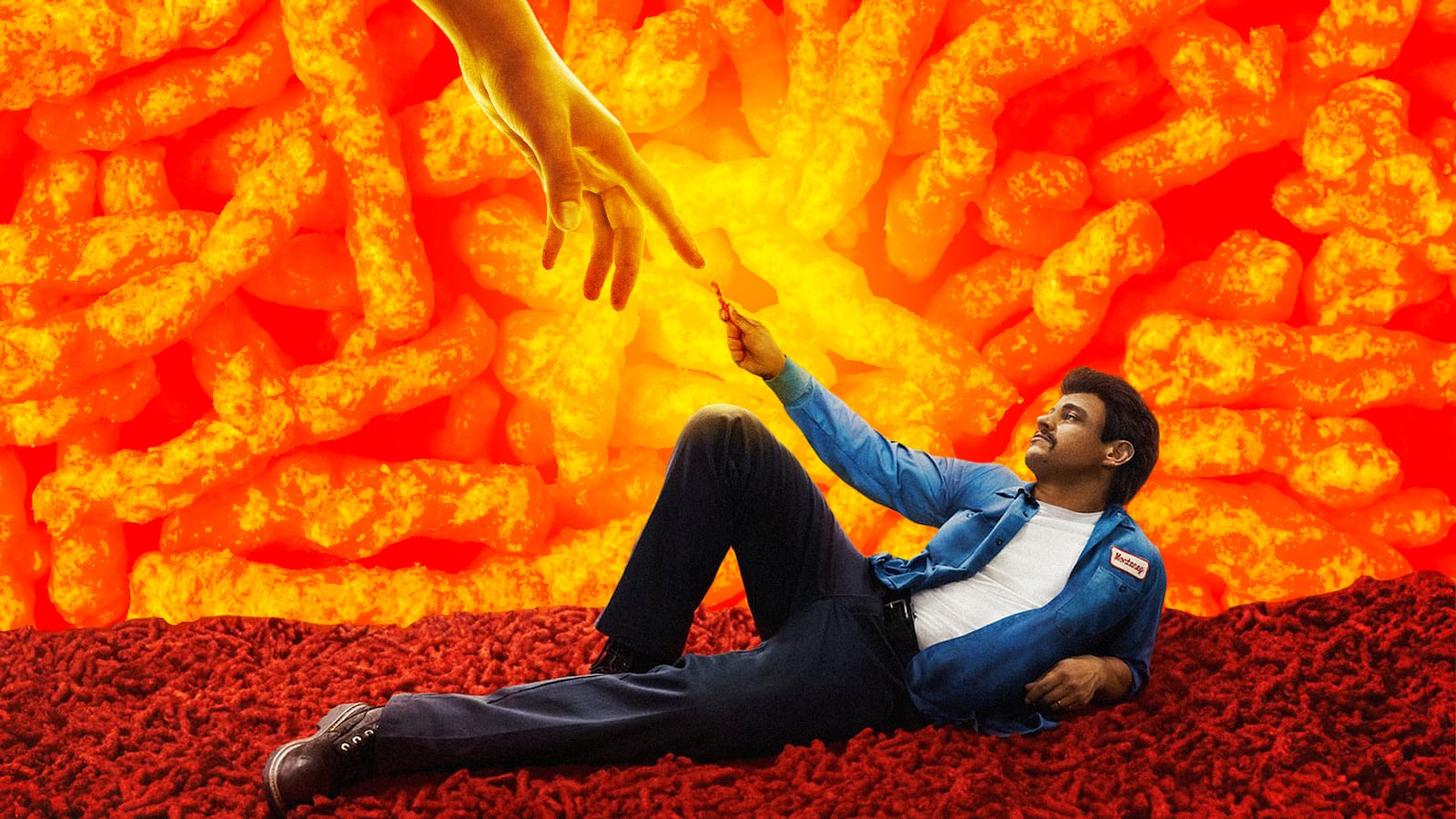Partway through his rags-to-riches origin story Flamin’ Hot, our plucky protagonist and narrator Richard Montañez pauses for an aside—a kind of record-scratch moment.
It happens right after we watch an itty-bitty Montañez cuffed and shoved into a police car, after trying to buy chocolate for his crush (and future wife) with money he’d rightfully earned. “When the world treats you like a criminal, you become one,” adult Montañez tells us. “Now, before you start talking smack about ‘why Mexicans always got to be gangsters,’ don’t,” he says, “because I lived it.”
Out Friday on Disney+ and Hulu, biopic-of-sorts Flamin’ Hot is determined to inspire. Just like its central couple—supposed Flamin’ Hot Cheetos inventor Montañez (Jesse García) and his ride-or-die wife, Judy (Annie Gonzalez)—the film is unfailingly upbeat, even as Montañez delves into topics like police brutality in his narration. Rather than crumble in the face of unfair, seemingly insurmountable adversity, these two always seem to meet fire with fire. (Or, at least, a very spicy slurry.)
As we quickly learn, Montañez’s life was a long journey well before he landed at Frito-Lay as a janitor and eventually helped launch one of our most iconic snack foods. The son of a Mexican immigrant, he spent years shrugging off insults (and worse) from white neighbors, job interviewers, and bosses. He sold drugs, and then he got his janitorial job at Frito-Lay. Then, Montañez realized his calling—inventing a snack that he knew his community would snatch off the shelves, if only one executive could be brave enough to believe in the Latinx market.
Don’t let the corporate setting fool you; there’s absolutely nothing stale about this story. After years of television directing, Eva Longoria’s feature debut is both winning and precisely crafted. García’s got charisma seeping from his pores, and the quiet vulnerability he brings to Montañez cuts through the (admittedly compelling) bravado. When he tears up, you feel it. Meanwhile, Gonzalez makes Judy a force of nature with a trademark blend of grit and compassion honed on other projects like Netflix’s Gentefied. (That show and Flamin’ Hot also have screenwriter Linda Yvette Chávez in common.)
Real life has already spoiled the movie’s ending, a hard-earned win that nonetheless feels even more satisfying when you actually get to see Tony Shalhoub warmly applaud for the man who was once his janitor. There’s just one catch: According to the Los Angeles Times, Montañez didn’t invent the Flamin’ Hot Cheeto.
Montañez has been telling his story for years through keynote speeches for large organizations, reportedly including Target, Harvard, and Wal-Mart, the Times notes. In 2021, however, the newspaper published an exposé that pointed out various anomalies in his chronology—including key dates. “Montañez made it, from rags to riches, from factory floor to corporate suite,” the report states at one point—based on more than a dozen interviews, the Frito-Lay archival record, and statements made by the company itself. “He just didn’t make Flamin’ Hot Cheetos.”
When Flamin’ Hot premiered in March out of SXSW, director Longoria told the Times, “We never set out to tell the history of the Cheeto. We are telling Richard Montañez’s story, and we’re telling his truth.”
As seen at the film’s premiere screening earlier this year at South by Southwest, Gonzalez is the kind of performer that can make the entire audience break into applause when she tells off the right person. And the laughs keep coming: Matt Walsh plays the perfect soul-dead boss, who never pronounces “Montañez” correctly, and Tony Shalhoub makes a fun, slightly idiosyncratic choice to play former Pepsi CEO Roger Enrico.
Watching Flamin’ Hot as it currently exists, it’s hard not to ask the admittedly futile question of what this film might’ve looked like if it had engaged with this tension. The Times does not dispute that Montañez rose the ladder, or even that he invented a variety of flavorful products based on his heritage, including a snack line called Sabrositas. The real bone of contention is simply this specific product. Montañez and his supporters insist he invented Flamin’ Hot Cheetos, while several others claim that he did not.
Putting aside the question of whether or not Montañez invented the Flamin’ Hot Cheeto, the PR debacle prompts an even more interesting one: Is the value of this story directly tied to the value of the product?
In terms of dollars and cents, it’s barely a question. Hollywood prizes pre-existing IP, particularly when said IP comes with strong brand recognition—Flamin’ Hot Cheetos have literally been at Fashion Week. It stands to reason that this snack’s story will sell more movie tickets (and speaking engagements) than a lesser-known iteration. But to borrow a phrase from Oprah, what is the truth that Flamin’ Hot is telling? What is the core of Richard Montañez’s story, if it’s not about “the history of the Cheeto?”
Here, it feels pretty impersonal. As relentlessly watchable as Flamin’ Hot might be—and I truly did gobble it up, from beginning to end—it also tends to hold viewers at a safe distance. Rather than get into the emotional toll of the hardships he faces, Richard’s narration sticks to wisecracks. At times, we’ll see an outburst from him or a wave of anxiety from Judy, but only for a moment. Its characters, inspiring as they might be, can also feel a little too composed to be believed. (Does Judy never get tired of being the perfect supporting character to her husband’s aspirations? Does he never lash out at anyone?)
There’s safety in retrospect, and at all times, Flamin’ Hot operates in hindsight. And just like how it shields us from the darker portions of the Montañezes’ journeys, the film also does not engage with those who claim its central tale is at least a little fictitious. As Longoria expressed, its creators are more interested in Montañez’s story than they are in a nonfictional account of the Cheeto—and it’s certainly not uncommon for biopics to take some liberties.
In the end, Flamin’ Hot is utterly charming—cleverly written and impeccably acted. It has all the beats of an uplifting fable, with a careful eye toward authenticity in its production. But its most powerful story really isn’t about Richard or Judy, or anyone in their orbit. Instead, the real triumph in this story appears to be the Latinx market—a powerful force that often goes ignored, especially in Hollywood. Learn how to whisper into it, this story tells us, and you could have a hot new chip (or movie) on your hands—perhaps even the power to change lives. Maybe just ignore that little voice in your head, reminding you that the “American Dream” is still just as disputable as Montañez’s own experience living it out.







